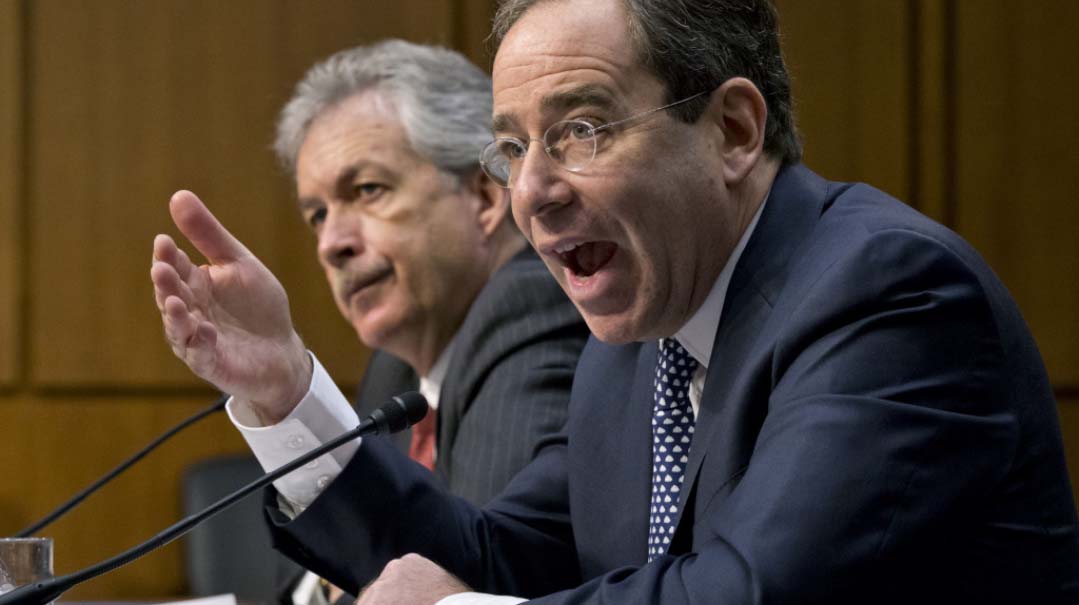New Envoy’s Plate Is Already Full

"Nides will be an excellent ambassador, although the sides won’t always agree about everything"

Photo: AP Images
After a long wait, Tom Nides’s nomination as US ambassador to Israel was finally confirmed this week. If he had entered his post several months ago, he might have had a relaxing few months in which to acclimate to his new job as Israel changed governments. But now he’ll have to jump straight into the deep water. The first order of business for the Americans is the opening of a consulate servicing Palestinians on Agron Street, Jerusalem.
While the administration has hitherto avoided picking up this hot potato for fear of toppling Israel’s coalition, the situation is different now that the budget has passed. The government is now safe. And the administration, which has already expressed blunt disapproval of building in the settlements and the labeling of six Palestinian NGOs as terror groups, is expected to get off the fence and deliver an opinion. It’s far from clear that Jerusalem will like what it hears from Washington, and it will be up to Nides to deliver the unwelcome message. Michael Oren, Israel’s former ambassador to the US, worked with Nides during the latter’s time as deputy secretary of state under Hilary Clinton. He tells Mishpacha that Nides will be an excellent ambassador, although the sides won’t always agree about everything.
“Tom Nides is a superb and seasoned diplomat, a person of great warmth and intelligence, and a mensch,” said Oren. “Though we may have policy differences with the administration, Ambassador Nides is the best person for bridging them.”
Another important issue for Israelis is the proposed visa exemption by the United States. The subject has been speeded up in recent weeks, and it’s fair to assume that when Nides puts on the pressure for the opening of a consulate, he’ll find himself pressured in turn to hurry up the visa exemption. It’s very possible that the two measures will end up happening at about the same time.
But most important by far is the Iranian issue. So far the communication between Washington and Jerusalem on this subject has been managed by Israel’s National Security Council head Eyal Hulata and his American counterpart, National Security Advisor Jake Sullivan. Starting this week, Nides will join the diplomatic team, to be followed in short order by Michael Herzog, his Israeli counterpart, who’s expected to assume his position in the coming days.
And indeed, the two sides have little time for beating about the bush, as the nuclear talks are set to reconvene in Vienna on November 29. It seems the Iranians stretched the rope as far as it would go, and only when they saw the Europeans and Americans were finally losing their patience did they announce their willingness to resume negotiations. But to what end? Do the Iranians genuinely want to reach an agreement? Or is this just another way to gain time while the centrifuges continue spinning?
“We should expect the Iranians to play for something even worse than the JCPOA — sanctions relief in exchange for even more limited and narrow nuclear concessions,” Richard Goldberg, senior advisor at the Foundation for Defense of Democracies, told Mishpacha. “Absent any sanctions enforcement, political pressure at the IAEA, or active military deterrence, Tehran is in the driver’s seat to play for time, keep the clock running on JCPOA sunsets, further stabilize its economy, and bank its nuclear advances as a new baseline for talks.”
I asked Goldberg what the US should do ahead of the talks. “The US cannot expect anything good to come by negotiating from a position of weakness,” he said. “The US should work with the E3 [France, Germany, and Italy] to pass a resolution at the upcoming IAEA board meeting censuring Iran for failing to cooperate with the agency’s investigation into undeclared nuclear activities and its continued limitation of IAEA inspector access. This should be coupled with a transatlantic understanding that unless Iran fully complies with its nuclear obligations within a set period of time, the E3 will move forward with the snapback of UN sanctions at the Security Council.”
(Originally featured in Mishpacha, Issue 885)
Oops! We could not locate your form.






